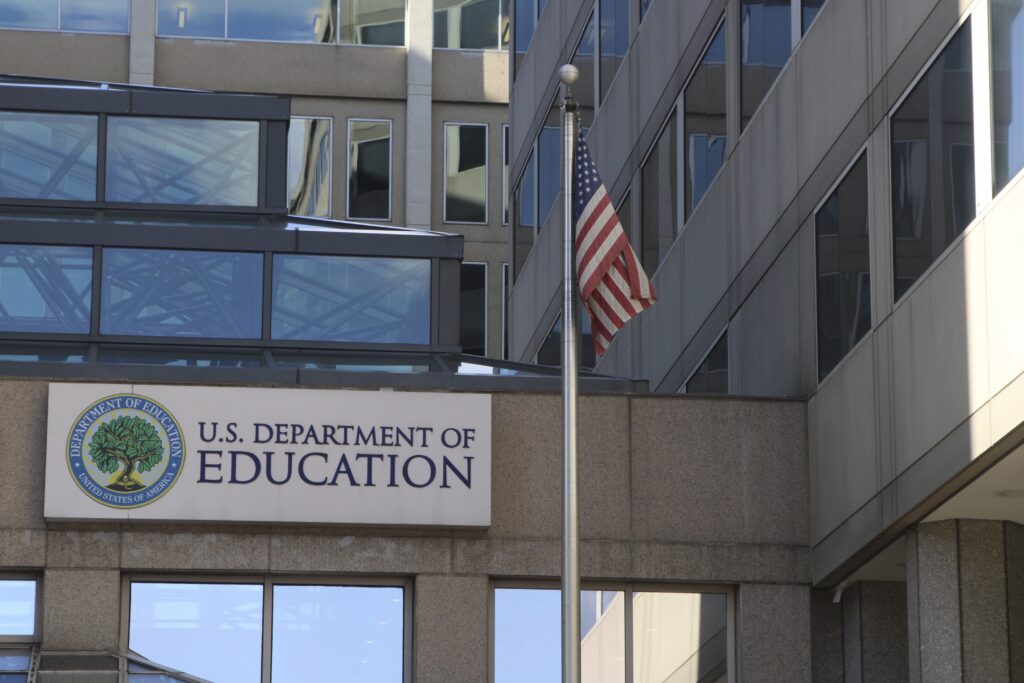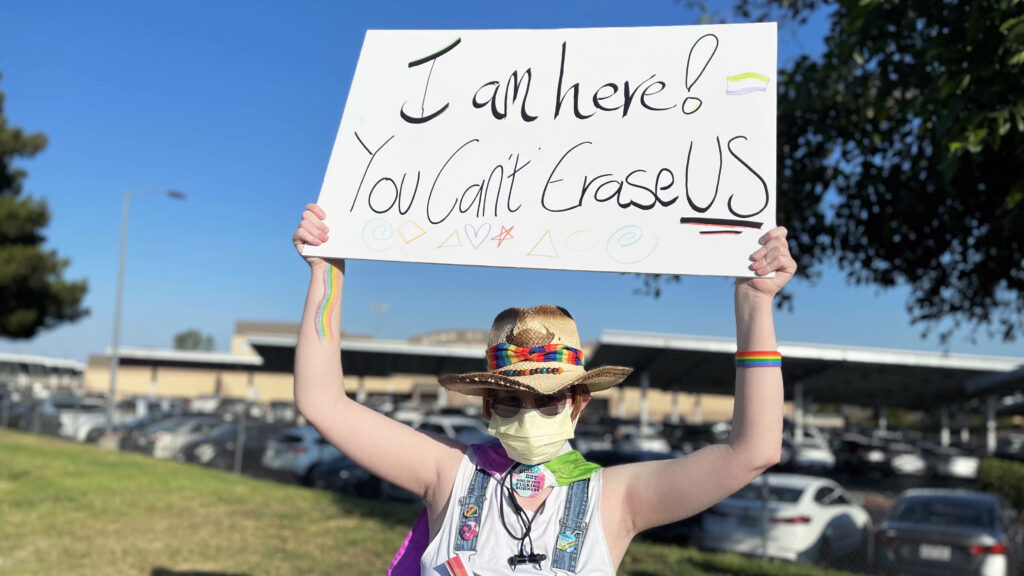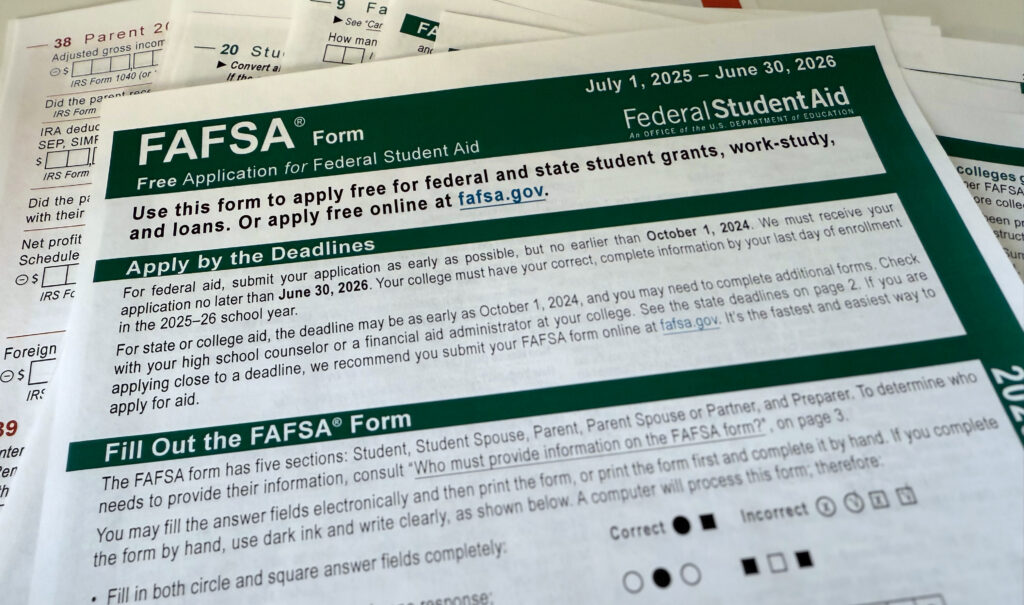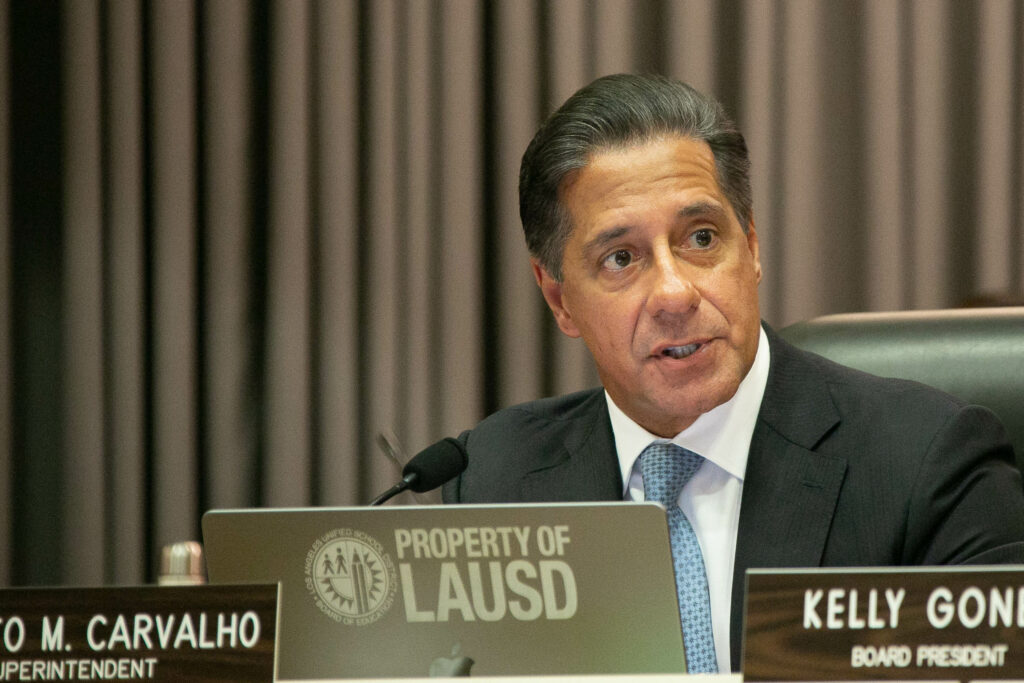
Credit: Carlos Kosienski/Sipa via AP Images
Top Takeaways
- $600 million in federal grants for teacher preparation is in limbo while the court decides whether the Trump administration can cancel the funding.
- Some California university and school district leaders are unsure whether programs can continue without help from the federal government.
- The loss of the programs, which sometimes offer stipends and other financial help to teacher candidates, could worsen an already dire shortage of teachers for hard-to-fill jobs.
- The number of teachers on emergency-style waivers and permits has tripled in the last decade. Teachers on emergency-style permits aren’t required to have completed teacher training.
The abrupt termination of $600 million in federal teacher-training grants by the Trump administration — and the uncertainty that remains while their cancellation is contested in court — have left teacher candidates and university and school district leaders worried about whether the programs they fund can continue.
The Teacher Quality Partnership grant and the Supporting Effective Educator Development grant have been used to help recruit and train teachers for high-needs schools and for hard-to-fill jobs, such as teaching science, special education and math.
At least $148 million in grants go to California teacher preparation programs.
“CSU simply does not have the resources to sustain these programs without funding from the U.S. Department of Education,” said Amy Bentley-Smith, director of strategic communications and public affairs for the university, in an email.
The loss of the grants, which fund programs at both universities and school districts, could worsen the state’s teacher shortage and force school districts to hire more teachers on emergency-style permits that don’t require them to complete teacher training.
“There’s still acute shortages of credentialed teachers in California,” said Dana Grayson, director of West-Ed’s Teacher Workforce team. “Numbers show that, in the past decade, the number of teachers who aren’t fully credentialed has tripled. So, really making sure we have fully credentialed teachers in classrooms is especially important.”
During the 2023-24 school year, the most recent year state data is available, 5% of California teachers were on emergency-style permits and waivers, according to newly released state data.
CSU can’t sustain programs alone
Without the grants, programs at four CSU campuses — Chico State, Cal State LA, Cal Poly San Luis Obispo and CSU Monterey Bay — could lose a total of $29 million. The funds provide stipends for teacher candidates, pay for professional development for student residents and their mentor teachers, pay staff salaries and for faculty release time, and support college preparation for K-12 students, Bentley-Smith said.
Terminating the teacher preparation grants before the end of their terms — usually five years — would likely result in many teacher candidates delaying or abandoning plans to become credentialed teachers, she said.
“The high-needs, high-poverty schools these programs support, which have historically experienced difficulty in recruiting and retaining teachers, will lose support, collaboration, and access to new and future teachers,” Bentley-Smith said. “Further, teachers in these schools will lose out on professional development opportunities that support them in meeting the needs of their students.”
Among the grants in danger of being eliminated is a five-year grant to address a chronic shortage of qualified teachers in rural northeastern California. The $2.4 million grant to Chico State supports a teacher residency program that recruits, trains and prepares teachers to work in high-poverty, hard-to-staff rural communities, according to the California Attorney General’s office, which has sued to stop the terminations.
Residencies allow teacher candidates to work alongside a mentor teacher in a classroom while completing their teaching credential.
The uncertainty around the grant “has led to significant disruptions in the program, including the inability to confidently plan for the upcoming year,” said Rebecca Justeson, a professor at Chico State’s School of Education.
Termination of the grant would result in two employees being laid off and another having their hours reduced, said Jennifer Oloff-Lewis, a professor at the College of Communication and Education at Chico State.
California State University officials would not comment on how many employees systemwide might be laid off if the grants are eliminated, saying only that the positions funded by the grants are usually terminated when grants end.
More than 1,000 students have completed CSU programs funded by the grants and have gone on to become credentialed teachers working in local school districts, said Bentley-Smith. About 300 teacher residents are in programs now. Some campuses have already committed funding and resources to support students for the upcoming school year.
Grants terminated with form letter
The two federal grants were terminated in early February by the U.S. Department of Education with a form letter that offered no specific reason, except to say that the program might promote diversity, equity and inclusion initiatives; violate civil rights law; be fraudulent, abusive, or duplicate other programs; or otherwise fail to serve the best interests of the United States, according to the lawsuit filed by the state of California and a multi-state coalition.
When asked if California State University’s diversity, equity and inclusion policies may have put it at odds with the Trump administration, Bentley-Smith said the university complies with all federal and state nondiscrimination laws.
“We regret that programs that promote equity in learning are being misconstrued as being inconsistent with federal priorities,” she said. “We can think of few greater priorities than ensuring all our youth are taught by skilled and qualified teachers.”
Credential programs for school staff also at risk
University programs aren’t the only ones under threat of losing grant funding. Some school districts and nonprofits have also won federal grants for programs to train and recruit teachers to fill hard-to-hire positions.
The Lindsay School District began a residency program in 2021 in an attempt to recruit and retain teachers. The district had been losing about 25% of its teaching staff each year, according to the National Education Association. Residents are paid $31,400 a school year, and their mentors $7,000.
Its $8 million federal teaching grant is among those canceled.
Special education is a shortage area that would be hit hard if it loses the grants.
“The sudden loss of federal funding for teacher residency grant programs will have a significant and profound impact on an already fragile system,” stated a letter from the Tulare Office of Education to state and federal lawmakers. “In 2020-21, 40 percent of schools hiring for open positions in special education reported having difficulties filling vacant openings as compared to 17 percent a decade earlier.”
Cases make their way through courts
The plaintiff state attorneys general argue in their lawsuit that termination of the grants, issued without warning, violates the Administrative Procedure Act, would impact teacher preparation programs, and immediately reduce the number of teachers and teacher trainees serving in schools.
The coalition won a temporary restraining order on March 10 from the U.S. District Court in Massachusetts, requiring the grants be restored temporarily while the case is being litigated. The reprieve was brief. The Supreme Court ruled on April 4 to allow the U.S. Department of Education to terminate the grants while the court case is being heard.
The Fourth Circuit Court of Appeals on Friday ruled on a separate lawsuit filed by the American Association of Colleges for Teacher Education, the National Center for Teacher Residencies and the Maryland Association of Colleges for Teacher Education. The court also lifted the temporary restraining order, citing the Supreme Court ruling, effectively freezing the grant funds for the plaintiffs in this suit.
Teacher preparation programs have an administrative appeals process that allows them to respond by letter to the allegations in the termination missive, according to Reach University President Joe Ross.
University leaders sent appeals for each of its three federal grants and received acknowledgment that their appeal had arrived, but otherwise have not heard back.
“As far as I know, I don’t know of any institution who has heard back on their efforts to engage with the Department of Education directly,” Ross said.
Program reaches out to high-poverty areas
Reach University had three federal grants totaling $14.7 million over five years that would be eliminated if the court ultimately agrees with the Trump administration. Although the nonprofit university is based in Oakland, it has been using the grants to support teacher candidates in high-poverty communities in rural Arkansas and Louisiana, where there are no universities within commuting distance.
The federal grant money was used to start partnerships with school districts and to recruit community college graduates who want to complete a bachelor’s degree while working in a classified position, such as a para-educator, after-school tutor, office clerk or bus driver, in a public school. After earning a degree, teacher candidates can become interns or residents in the district while earning their credential through the university.
Reach University has had to make immediate cuts, including laying off some staff members and suspending third-party evaluations of the program. The evaluations were used to determine the efficacy of the program and to allow grant programs to share best practices.
Ross is trying to find local funding to help sustain the work, but there are no plans to reduce the number of teacher candidates the program supports. He is afraid that staff cuts may impact teacher recruitment.
But Ross is optimistic about the long-term sustainability of these programs. He believes the funding will be replenished somehow because of broad bipartisan support for building a robust teacher pipeline across the country.
“I think that if you travel through rural communities in California, rural communities in eastern Arkansas, or rural communities in northwest Alabama, you will see lots of different kinds of people, but they’re all trying to figure out how to find enough teachers to serve their kids,” he said.






